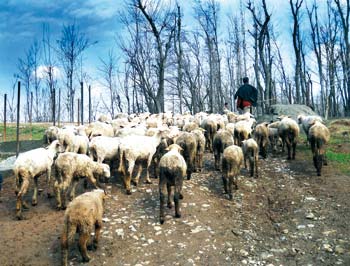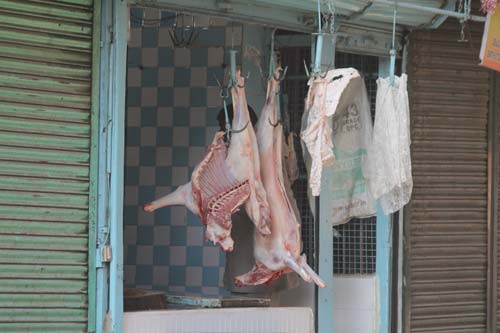The standoff between government and mutton retailers has put the mutton-loving majority in Kashmir on the edge as powerful middlemen who control the supply chain are not ready to yield. Bilal Handoo finds out as to why pasture rich valley relies heavily on imports from the desert of Rajasthan to satisfy its meat cravings.
Kashmir consumes 75,000 kg of mutton daily. Any unplanned hike in the price instantly becomes talk of the town. With marriage season already here, the war over retail price of mutton has put both retailers and consumers in a dock. Traditionally the supply chain of mutton in Kashmir was controlled by the dealers, locally known as Kothdars. But as the yearly sales touched Rs 1000 crore mark, Kothdars lost their monopoly over supply chain and the market is now ruled by powerful middlemen.
Once an organized sector, the supply chain of mutton got hijacked by these new players who work as intermediaries between producer and retailers.
Irritated by government cap on retail rates and its inability to crackdown on middlemen, who actually control the market, mutton retailers decided to go on an indefinite strike.
But the controversy over retail mutton price is not new to Kashmir. In 1993, during peak militancy, it was only after Hizbul Mujahideen’s intervention that the deadlock between retailers and suppliers was broken. They had then fixed the retail price at Rs 46 per kg.
Escalating Costs!
The present deadlock between retailers and suppliers has confused the end users as retailers sell mutton between Rs 320 to Rs 350 per kg, against Rs 298 set by the government.
Many believe the surge in mutton prices during last four years, which is around 200 per cent, is result of ‘unregulated’ practices prevailing in the sector.
However the price rise is not exclusive to Kashmir, many other states in India saw such hikes in past few years which experts blame to increased transportation costs. It costs around Rs 60,000 to transport a truckload of livestock from Delhi to Srinagar, said a middleman in defense of recent price hike. “We have to pay Rs 5000 to the caretaker who travels with livestock just to make sure it reaches Kashmir safely,” he said.
Everyday around 50 trucks carrying sheep worth Rs 2.5 crore reach Kashmir. “There are around 150 sheep in a truck,” said a Srinagar based mutton dealer.
According to data made available by CAPD, in last one decade mutton prices saw a 200 per cent hike. In 2003 mutton was sold for Rs 110 against current price of Rs 330 per kg.
With no system in place to regulate mutton prices, middlemen increase prices at will.
The mutton prices started to escalate since July 2009 when it became dearer by Rs 65 per kg all of a sudden and was sold at Rs 180 per kg.
During 2010 summer unrest, when Kashmir was under curfew and there was shortage of essentials in the market including mutton, the prices surprisingly remained unchanged.
However, in April, 2011 mutton prices were once again raised by Rs 60 per kg to Rs 240 per kg and by June, 2012 it had reached Rs 280 per kg.
With middlemen calling the shots, CAPD realized that they have become irrelevant and decided to formalize the retail prices.
Against CAPD’s fixed price of Rs 298 per kg, retailers sell mutton anywhere between Rs 320 and Rs 340 per kg.
At loggerheads!
 Khazir Muhammad Regoo, president Kashmir Mutton Retailers Association, says rates are beyond the control of union, as it is the middlemen who actually
Khazir Muhammad Regoo, president Kashmir Mutton Retailers Association, says rates are beyond the control of union, as it is the middlemen who actually
















